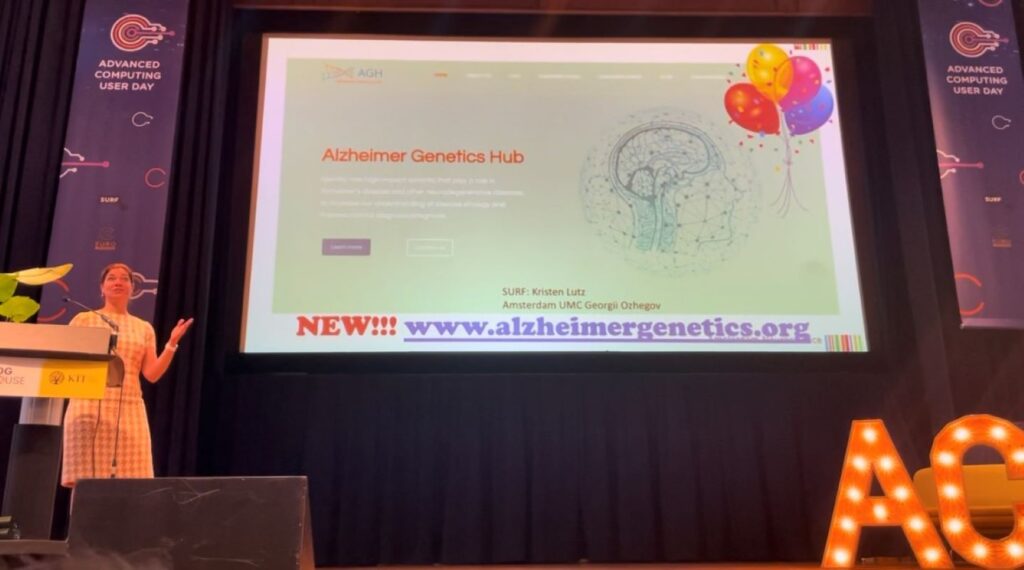Introducing the
Alzheimer Genetics Hub
In an ambitious move, the Section on Genomics of Neurodegenerative Diseases and Aging is leading a large international effort to analyze genetic sequencing data from Alzheimer’s cases and cognitively healthy controls. Recently, this team has made significant progress, identifying new, rare gene variants through the comparison of DNA exome sequencing data from over 40,000 participants.
2023 marked a milestone with the sequencing of three times as many genomes. To bolster their genetic analysis capabilities, the section, headed by biochemist Dr. Henne Holstege, has partnered with the Dutch Supercomputer facilities (SURF).

The pioneering Alzheimer Genetics Hub platform provides supercomputing power essential for identifying rare, high-impact variants that contribute to Alzheimer’s and other neurodegenerative diseases.
Dr. Holstege explains, “Identifying the rare genetic factors requires comparing large groups of patients and healthy individuals to gather sufficient evidence that a particular variant increases disease risk. We have processed almost 100,000 genomes from Alzheimer’s Disease patients and healthy individuals.”
“Now, with the Alzheimer Genetics Hub platform at SURF, we have supercomputing power to identify additional rare high-impact variants that play a role in Alzheimer’s disease and other neurodegenerative diseases.”
Dr. Henne Holstege, Head of the Section Genomics of Neurodegenerative Diseases and Aging
A Secure and Collaborative Analysis Environment
This research effort is part of a broader collaboration including the Alzheimer Disease European Sequencing consortium, the American Alzheimer Disease Sequencing Project, and other global partners. Together, they bring their data to the Alzheimer Genetics Hub, a secure environment designed for collaborative analysis. This hub is crucial not only for the safety of genetic data, compliant with the EU’s stringent General Data Protection Regulation (GDPR), but also for enabling global research collaboration without the need to transfer large datasets.
Users have access to powerful data processing and storage systems, along with fast network connectivity. A unified bioinformatics pipeline for analyzing the data also ensures optimal control over false positives arising from batch effects, which are common when data is generated using different methods at various locations, according to bioinformatician Dr. Marc Hulsman, who is coordinating the project.
Despite the challenges of managing such a large-scale project and the intense focus it demands, Dr. Holstege is optimistic: “The creation of this hub has indeed stretched our capabilities, but I believe we are really giving Alzheimer’s research a boost here. By providing a secure yet flexible environment for collaboration on large datasets, we can enhance our understanding of disease etiology and improve clinical diagnosis and prognosis.”
“Technologies are advancing quickly, we can do so much more than five years ago. I am optimistic that one day treatments will be possible. However, these will not be one size fits all treatments: they will be tailored to counter individual vulnerabilities. To identify those before onset of symptoms, interpreting our individual genetic constellations will be of crucial importance.”
Dr. Henne Holstege, Head of the Section Genomics of Neurodegenerative Diseases and Aging
For more insights and updates from the Section on Genomics of Neurodegenerative Diseases and Aging, visit the Holstege Lab website or watch their latest discussions on YouTube.